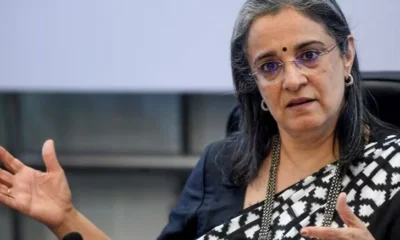The Bombay High Court has ruled that wife is entitled to maintenance from her husband even if she earns while disposing of the application challenging the quantum of maintenance granted by a family court.
The High Court passed this order on the revision application filed by husband against the judgment of the Family Court wherein the judge had granted payment of Rs 15,000/- per month as maintenance to wife from the date of application and amount of Rs 7,000/- as cost of litigation under section 125 of the Code of Criminal Procedure 1973 (“the Code”).
A single-judge bench of Justice N.J. Jamadar, however, noted that the Family Court didn’t consider that the wife had a source of income from Beauty Parlour business.
“In the totality of the circumstances and upon consideration of the relevant factors including the income of the Respondent, the number of dependents upon the Respondent, the reasonable wants of the Applicant, in my considered view a sum of Rs. 12,000/- per month would be a reasonable financial support to augment the income of the Applicant,” said Justice N.J. Jamadar.
Applicant (wife) and respondent (husband) were married on November 12, 1997. The wife claimed, since the inception of marital life, she was treated with cruelty by her husband.
In April 2007, the respondent expressed desire to obtain divorce from the applicant. The wife claimed that in order to avoid harassment at the hands of her husband, she signed the mutual divorce petition documents on the assurance of her husband that he would continue to maintain the marital relationship with her despite a paper decree of divorce.
Accordingly, a decree of divorce by mutual consent was obtained on 25th October, 2007. Despite, the decree of dissolution of marriage, the respondent continued to visit the applicant’s house. But from September 2012, the respondent stopped visiting the applicant’s house. The wife claimed that since she had no income to support her, she filed an application for award of maintenance at the rate of Rs.50,000/- per month, under section 125 of the Code.
Meanwhile, the respondent (husband), who was remarried in 2011, told the family court that applicant wife had started beauty parlour business and was financially independent, and hence she decided to forego maintenance she is entitled to under Section 125 as part of the mutual agreement before the decree of divorce was passed. He also opposed the maintenance application citing losses in business.
The learned family Judge was of the view that the fact that the Applicant had given up her claim for maintenance when the decree for divorce by mutual consent was passed, does not detract materially from her claim as such an agreement not to claim maintenance or waive the right of maintenance was opposed to public policy.
The Applicant being a wife, despite being a divorcee, within the meaning of Explanation (b) to section 125(1) of the Code, the agreement to reside separately from the Respondent does not disentitle her from claiming maintenance, held the learned Family Judge and fixed payment of Rs 15,000/- per month as maintenance to wife from the date of application.
Being aggrieved, the aforesaid reasons and findings the Respondent-husband invoked the revisional jurisdiction of the High Court. The counsel for the Respondent-husband urged that the learned Judge, Family Court committed a manifest error in arriving at a finding that the Respondent had refused or neglected to maintain the Applicant and that the Applicant was unable to maintain herself.
Amplifying the submission, the learned counsel said that the Applicant having voluntarily relinquished her right of maintenance when the decree of divorce by mutual consent was passed on 25th October 2007, was not legally entitled to turn around and seek maintenance from the Respondent.
“The fact that the Applicant resides separately from the Respondent in pursuance of the decree of divorce, even if taken at par, thus does not disentitle the Applicant, being a divorced wife, from claiming maintenance, urged the learned counsel for the Applicant. The agreement not to claim maintenance which is in teeth of the statutory provision, the object of which is to prevent vagrancy and destitution, does not operate as a bar to claim maintenance. Such an agreement, being opposed to the public policy, does not override the statutory ameliorative provisions,” urged the counsel for the Applicant.


 Latest world news18 hours ago
Latest world news18 hours ago
 Latest world news18 hours ago
Latest world news18 hours ago
 Latest world news18 hours ago
Latest world news18 hours ago
 India News18 hours ago
India News18 hours ago
 India News9 hours ago
India News9 hours ago
 Latest world news9 hours ago
Latest world news9 hours ago














